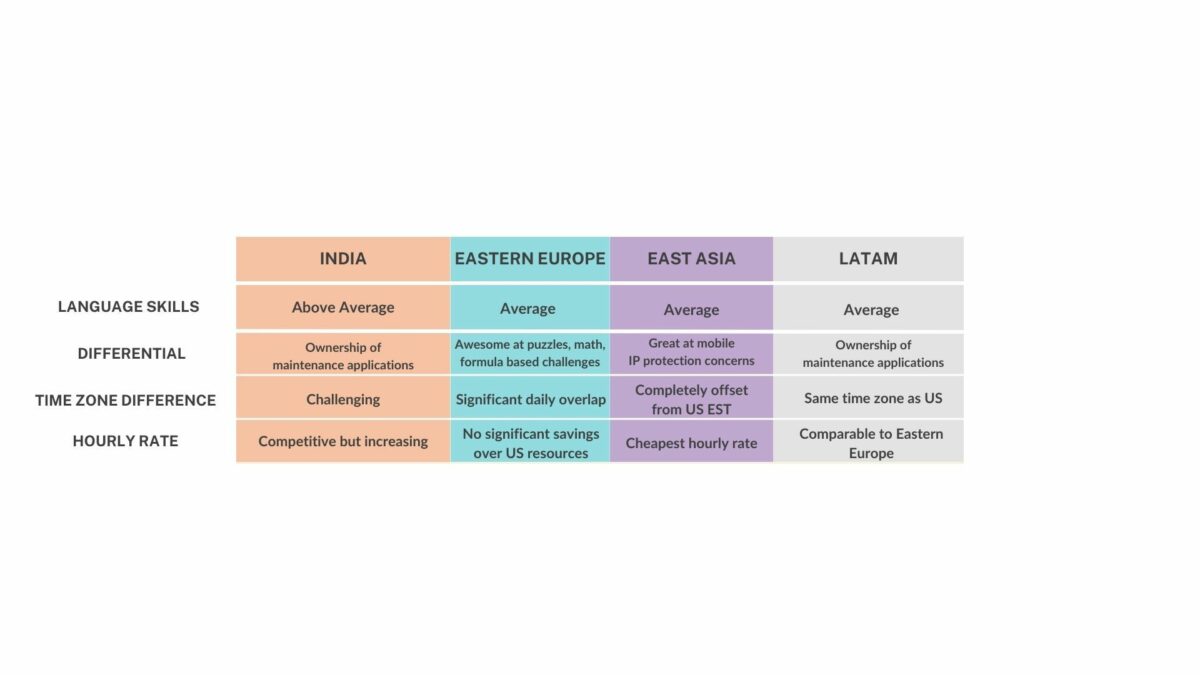The early signs of recession have led many companies to review their budgets. In fact, the recent wave of layoffs in the tech industry shows us that this is the moment to rethink our strategies. Hiring freezes, downsizing, or even setting up teams abroad are possible solutions. That is why many software companies use this context to do things differently and expand their operations outside the US. Like other CTOs and CPOs, you too can take advantage of this momentum to upskill your team (reel in high-performers that weren’t previously available) and do smarter budgeting (hiring more senior talent at lower cost), among other things. The question is, where can you find such talent without the need for visa sponsorship? The answer lies in Latin America.
But why hire in Latin America?
LatAm has become a hotspot for software development due to its highly skilled talent pool and cost-effectiveness. The cultural alignment with the United States is a welcomed bonus. This option is even more attractive for tech companies when compared to other regions.

Over the last few years, the tech ecosystem in LatAm has been growing at an unprecedented rate. Yet, several latin SMBs have come to a standstill in the early months of 2023. Former industry trailblazers such as iFood, Nubank and PagSeguro laid off nearly one thousand tech pros.
In turn, European businesses such as Deezer and Zalando already recognize this as the right time to act. Companies are seizing the opportunity to expand capacity. It’s time for North American companies to follow suit – evaluate if you too should take advantage of this effervescent environment. This is the time to tap into previously inaccessible A-listers at competitive rates.
If not, you may risk falling behind. Teams that delay their recruitment roadmap will miss out on the chance to hire top-notch talent. Implications can compromise expansion plans and revenue.
The good news is that recruiting and hiring tech pros in South America doesn’t mean hassle. There are options at different pay grades and risk tolerance levels, and there isn’t a real need for visa sponsorship. In other words, early-stage startups and SMBs have a shot too!
If you are considering this as a possible business decision, here are the pros and cons to consider. Read on for the potential benefits and drawbacks of expanding into this region. Or, if you prefer, reach out for a free consultation on possible ways ahead.
Cost-effectiveness
The recurrent layoffs in Brazil, Argentina, and other Latin American countries made good talent available. If you are looking to hire great people and propel your business forward, it’s important to look beyond direct compensation.
For a correct estimate, the monthly cost per team member per region should also take into consideration costs with fringe benefits, payroll and legal services, plus equipment and logistics.
You should also be aware there needs to be an annual catch-up with the local CPI. If tenure is a concern, consider providing additional pay bumps based on each individual’s performance over time, including for 3rd-party contractors.
Skilled Talent Pool
Latin America boasts a highly skilled and educated workforce, particularly in the tech industry. With a large pool of talent and a growing number of universities and training programs focused on technology, expanding operations to Latin America can help you access a high-quality workforce with specialized expertise.
| Top Programming Languages in LatAm | Top Stacks in LatAm | Most Common Platforms |
| JavaScript
HTML HTML5 Python C# C++ Ruby Angular Kotlin |
Full-stack developers (39%)
Front-end developers (23%) Back-end developers (17%) App developers (7%)
|
Amazon Web Services
Windows Linux Docker Heroku
|
How US time zones overlap with LatAm’s

All rights reserved to Building and Managing High-Performance Distributed Teams: Navigating the Future of Work by Alberto Silveira – Head of Engineering at LawnStarter.
Collaborating for Success
We know the tech industry is highly collaborative, and outsourcing to LatAm can help your business tap into a more diverse network of innovators and entrepreneurs.
When working with distributed teams, we recommend CTOs and CPOs focus on two success factors:
- Documentation must be written down, have one single source of truth, and be accessible to everyone. Make sure policies, standards, and guidelines are in place.
- Communication should be based on an agreement on definitions, terminologies, and communication channels. Organize catchups, collaboration and focus time slots.
- Meetings are inevitable and should happen, but only in effective ways. Before scheduling, consider cost, agenda, and engagement.
For an in-depth look, here’s an interview with LawnStarter’s CTO Alberto Silveira.
Did you feel encouraged to go beyond your own team? The local tech ecosystem is booming in potential partnerships, joint ventures, and knowledge-sharing. Want to know more? Hit us up for a quick chat.
Compliance and Risk
A frequent misconception is that recruiting abroad is only about talent mining and vetting. The biggest possible cost in nearshore and offshore teams is actually a liability.
There are risks associated with outsourcing software development and IT staff augmentation. Some examples are:
- Quality of service: when hiring directly, how can you be sure of connectivity and expertise?
- Co-employment: if contractors have full dedication and recurrent interactions with a manager in your organization, can they sue?
- Intellectual property rights: how can you identify conflict of interest and enforce measures that protect industry secrets?
- Data privacy and information security: how do you comply with CCPA, CDPA & CPA and similar standards? Depending on the industry, SOC-2 or HIPAA are also concerns.
Software companies must ensure that they are complying with all relevant regulations and laws in both their home country and LatAm. This requires a thorough understanding of the legal landscape and can add complexity to the expansion process. Counting on the support of a reliable service provider is a must.
Full-Structure, Nearshore Outsourcing, or Talent-as-a-Service? Picking the Right Model
There are different models that you can use to expand your business operations to LatAm, such as full-structure, nearshore outsourcing, or talent-as-a-service. Each model has its advantages and disadvantages, and the choice will depend on your specific needs and goals.
| Company Maturity Level | Early-stage | SMBs & Scale-ups | Enterprise & IPOs |
| Context and challenges | Bootstrap companies that are at the proof-of-concept stage need to bring in people with the most seniority and passion. There isn’t much room for hand-holding in extremely lean teams. | Funded companies, concerned about ROI, face scalability issues and require experienced and committed individuals to overcome the challenges of lean teams. | Enterprises and IPOs face the challenge of complying with financial, labor, and regulatory stakeholders. Navigating this complex landscape demands careful planning, risk management, and proactive compliance measures. |
| What to look for when growing the team | Taking in big-picture thinkers to lay the groundwork. At this stage, any decisions will directly influence product architecture, but also team culture… and business as a whole.
Hiring a strong in-house tech lead / CTO is a must. If you’re short on budget, a dev shop is possibly enough to build the MVP. However, it will cost you visibility on how the product is being built. |
It is crucial to bring in problem-solvers who can effectively tackle the challenges at hand. This may require a combination of in-house teams and a staff augmentation approach following a one-team style.
The goal is to engage individuals who can think holistically and lay the groundwork for addressing technical debt. |
Seek analytical collaborators who value processes. Optimize team growth with in-house teams, staff augmentation, and a trusted dev shop.
Build a dynamic team capable of delivering high-quality results while maintaining a focus on process-driven success. |
| Best selling point to lure LatAm software engineers and product experts | If compensation isn’t a key differentiator yet, hiring managers and recruiters can pitch “opportunity”. Talent gets to expand business acumen and gain a broader view of user XP. | Embrace innovation and a lean culture that fosters experimentation. Offer the candidates the opportunity to be at the forefront of cutting-edge technologies and collaborate with a diverse team of experts. | Offer the chance to dive into complex projects and expand skill sets due to ample resources and support to tackle challenging problems and innovate. |
How do I Hire People on the Ground to Build My Team?
Hiring people on the ground in LatAm can be challenging, especially if you’re unfamiliar with the region. Partnering with recruitment agencies or experts with experience in the local market can help you navigate the cultural and legal landscape and ensure that you are hiring the right talent for your needs. Here are some pros and cons of each option:
-
- Hire directly via your HR
- Pro: no intermediates
- Con: no intermediates but you don’t know the talent pool and the regulations to be fully compliant
- Hire using a platform or recruiter
- Pro: they know the talent pool
- Con: they won’t support you with compliance, logistics, or talent retention
- Hire directly via your HR
- Grow using staff augmentation / talent-as-a-service
-
- Pro: they solve the previous issues
- Con: it may cost you a bit more
So pick the option with better value-for-money and ask yourself:
- Do they hire specifically for you, or have people on the bench?
- Who takes on the liability for employment, monitors performance, and responsibility for accountability and compliance?
- Who provides equipment and sorts out logistics?
Diving Deep: Context and Regulations You Need to be Aware Of
It is essential to have a thorough understanding of the context and regulations in the region before outsourcing to LatAm. Your business must be aware of cultural differences, legal requirements, and tax regulations. Plus, ensure that the team is complying with all relevant data protection laws and regulations. If this sounds cumbersome and scary, it doesn’t have to be: all you need is the right ally on the ground!
Insurance
It’s common for US and UK companies to require:
- Professional Liability Insurance,
- Fidelity/Crime Bond insurance,
- General Liability Combined Single Limit (CSL), and
- Workers’ Compensation insurance,
…yet, Latin American countries have different legal frameworks and market options. For example: at Ubiminds, it’s been our experience in the past that American brokers don’t want to insure/cover workers abroad, and Brazilian brokers don’t want to pay premiums to US companies.
As a result, companies face two possible options:
- Hire talent directly through platforms such as Papaya or Deel, and risk liability should such situations arise; or
- Go through a turnkey staff augmentation firm, under which case your company is kept safe because engineers are engaged with their entity, not yours.
One possible way to address this issue is by adding language to the Service Agreement to circumvent these scenarios. One can insert clauses by establishing limitations of liability and/or indemnification. Reach out to Ubiminds for a free consult.
Work hours
These too do vary from country to country, but the rule of thumb has it that overtime is compensated with an additional percentage and is capped off with a maximum amount per week.
In Brazil, there are rules about how long an employee can work and how much they get paid for working extra hours. The law says that a person can work up to eight hours a day and 44 hours a week. If they work more than that, the employer has to pay extra for each additional hour. The extra pay has to be at least 50 percent more than the regular pay, or 100 percent more if they work on weekends or holidays. This extra pay also affects how much the employer has to pay in taxes and social security, which can make it more expensive for you to pay for overtime.
In Argentina, the standard workday is eight hours for most workers, but for those on night shifts, it is reduced to seven hours. The maximum workweek is 48 hours, with no more than three hours of overtime allowed per day. Employers must also provide double compensation for work performed outside of regular business days, which includes Saturday afternoons, Sundays, and national holidays.
Ubiminds can guide and implement these for you, adjusted to the specific Statement of Work (SOW).
PTOs and leave of absence
In most of Latin America, paid time off includes weekends and national public holidays, as well as vacation time. Statutory benefits that are available to employees and executives who are engaged in an employment relationship include:
| Brazil | Argentina | USA |
|
|
|
When working with Ubiminds, you get support to put legal instruments in place so that teams comply to your holiday schedule instead of local ones. Also, you can consider setting specific dates for vacation, or set up accumulative PTO patterns that work best for your business.
Taxes
Most CHROs and CFOS are curious as to how much money actually makes it to their LatAm team member’s pockets, and how much is lost along the way. For clarification purposes, here are the major tax rates when it comes to payments and compliance.
| TAXES ON COMPANIES | TAXES ON TEAM MEMBERS | |
| ARGENTINA |
|
|
| BRAZIL |
|
|
| USA |
|
|
Ubiminds’ Finance and Accounting teams can provide additional information and make sure you arrive at a win-win scenario for your company and the tech pros you onboard.
Business Maturity vs. Effort vs. Budget
When considering expanding outsourcing to Latin America, you must consider your business maturity, effort, and budget. Businesses that are more mature and have more resources may be able to handle more complex expansion models, such as full-structure. On the other hand, companies with fewer resources may opt for talent-as-a-service or nearshore outsourcing to minimize costs. Here are a few examples:
Early-stage companies are usually bootstrapped and often at POC, looking for the most seniority and passion.
- Big-picture thinkers that can drive product development
- Engagement: teach lead + dev shop
- Opportunity: learn about business and get a broader view of user experience
SMBs and Scale-ups are normally funded, meaning ROI is a point of concern and face scalability issues.
- Problem-solvers for technical debt
- Engagement: in-house teams + one-team style staff augmentation
- Opportunity: work with innovation, lean culture allows experimentation
Enterprises and IPOs businesses require compliance with financial, labor, and regulatory stakeholders.
- Analytical collaborators true to processes
- Engagement: in-house teams + one-team staff augmentation + dev shop
- Opportunity: learn complexity with more resources
Ubiminds is Your Force on the Ground: Reach Out to Build a Tailored Roadmap with Our Support
Expanding business operations to Latin America can be challenging, but with the right partner, it can lead to a successful venture. At Ubiminds, we possess the expertise and experience necessary to guide your tech company through the complexities of the cultural and legal landscape in LatAm to help you find the right talent. We offer:
- IT Recruitment Services BPO: find people with the right motivation, skills, and grit.
- Payment and Compliance BPOs: comply at zero risk. We take on liability instead of you.
- Retention Services: our PeopleOps powers your initiatives.
Curious if you should expand to LatAm? Schedule a free 15-min consult and clear all your doubts.

Dad, Marketer, Salesman, Guitar Player. Self-starter, agile learner, and people-oriented, Thiago Reis is passionate about shaping the future of tech. Specialized in the Education Sector, previously excelling in Telecom, ISPs, and Digital Agencies.


